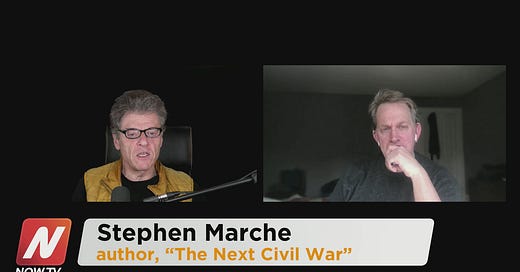I have to admit I absolutely HATED Alex Garland’s new movie Civil War. I found it annoyingly trite, self-evidently packaged for an ahistorical cinematic audience addicted to the amnesia of mindless violence. That’s fine, of course, for most Hollywood productions, but not for a supposedly serious movie about the American future by a highly talented filmmaker. However, my Canadian friend, Stephen Marche, author of the much acclaimed The Next Civil War, clearly disagrees with my own (elitist) critique of Garland’s movie and I tried to keep my own views out of our conversation. As Marche also noted in a recent New York Times op-ed, Garland’s movie matters for reasons different from you think. “The Americans of 2024 can easily imagine a civil war,” Marche writes. And the step from imagination to reality, Marche warns, isn’t always as gigantic as we assume.
Stephen Marche is a novelist and essayist, and the author of, among other works, On Writing and Failure and The Next Civil War. He has written features and essays for The New Yorker, The New York Times, The Atlantic, Esquire, The Walrus and many others. He has collaborated with artificial intelligence on the first AI-generated novel reviewed in The New York Times, Death of an Author. His most recent novel, The Last Election, was co-written with Andrew Yang.
Named as one of the "100 most connected men" by GQ magazine, Andrew Keen is amongst the world's best known broadcasters and commentators. In addition to presenting KEEN ON, he is the host of the long-running How To Fix Democracy show. He is also the author of four prescient books about digital technology: CULT OF THE AMATEUR, DIGITAL VERTIGO, THE INTERNET IS NOT THE ANSWER and HOW TO FIX THE FUTURE. Andrew lives in San Francisco, is married to Cassandra Knight, Google's VP of Litigation & Discovery, and has two grown children.













Share this post